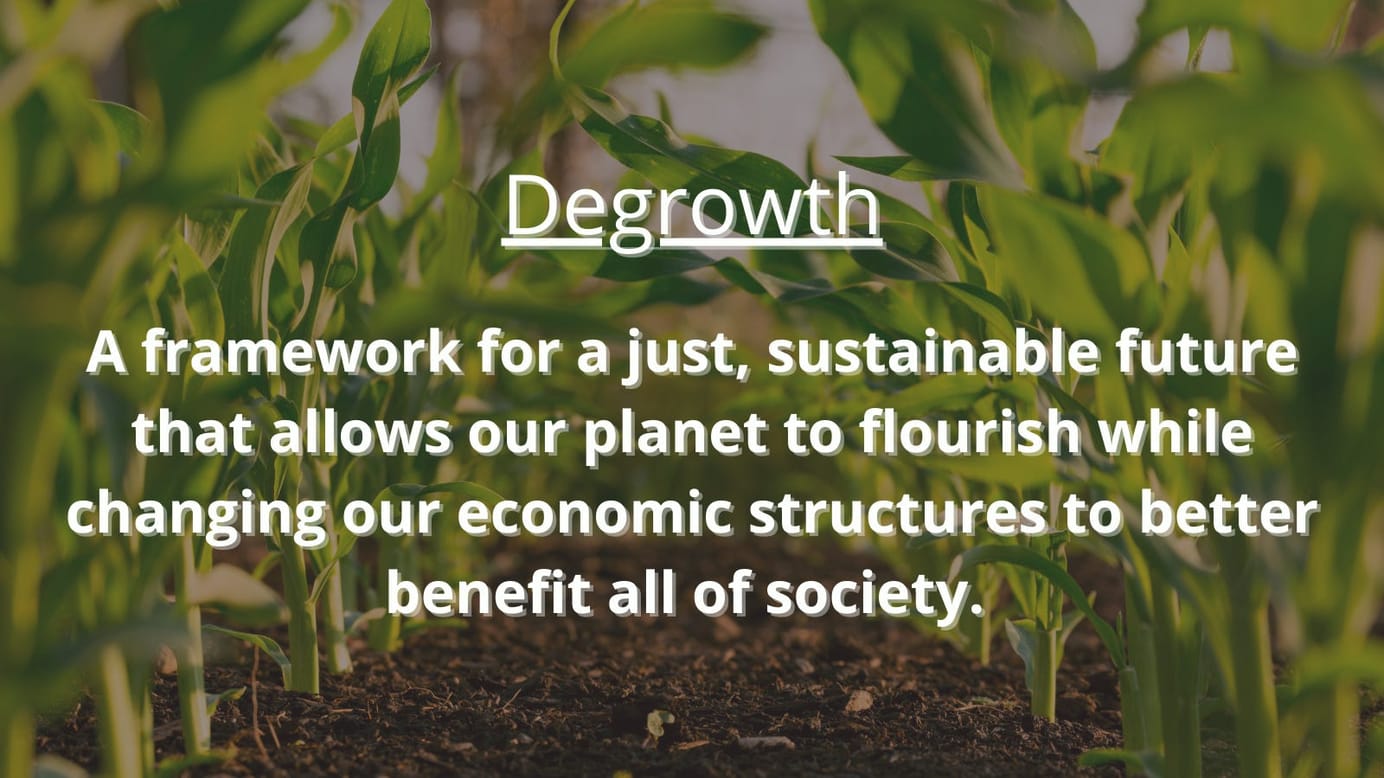
Degrowth | The Climate Solution Already Within Reach
Part IV: Rethinking Economic Systems to Grow Climate Resiliency
This month, we’ve talked a lot about the economic forces that are preventing us from really addressing the climate crisis. IDK about you, but climate news can be a real drag sometimes. It’s no wonder depression and anxiety in teens have skyrocketed!
So for our last newsletter in our climate series, we’re going to take the positive route.
Last week, I introduced a concept called Degrowth.
There are a lot of misconceptions (or deliberate misinterpretations) around degrowth. When people hear that the goal is to reduce the size of our economy, there’s some discomfort. It makes sense. Growth has been such a key theme in our society (discussed in week 2) that it’s hard to think outside of a growth mindset.
Because growth has been so engrained as the key goal to success (which excludes our own well-being), it’s easy for people to assume that degrowth is an austerity measure that will ask us to limit our lifestyles and deprive us of good stuff. A growth mindset assumes that degrowth leads to rising unemployment, inequality, and debt, but that doesn’t make sense. We’re already there within capitalism (discussed in week 3).
These criticisms couldn’t be further from the truth. In reality, degrowth would give everyone an opportunity to thrive, while saving the planet.
But what I love most about degrowth is that it is a utopian project that’s rooted in reality. It embraces the need to think and act beyond the present and to propose an alternative future.
Optimism! Can you feel it?
Degrowth: It’s Already Here
So what exactly could that future look like? I could spend an entire book talking about this, but today I’ll just touch on a few examples of how degrowth is already showing up in our societies.
Unions & Worker’s Rights
As red states ramp up their anti-trans, anti-abortion, pro-gun agenda, Michigan has been quietly leading the way as a progressive state expanding its people’s freedoms.
In a state that once looked like Wisconsin (gerrymandered into GOP control), the democratic trifecta has been expanding people’s rights. In March, Governor Gretchen Whitmer signed the bill to repeal the horribly named “right-to-work” laws which have weakened unions’ ability to organize.
It’s hard to overstate how this one bill leads to a waterfall of increased freedoms. This one simple bill will allow workers to organize, union membership to grow back to its General Motors factory days, and eventually lead to greater political power for workers, not just their employers.
Expanding worker’s rights allow all of us to have better control over our daily lives, work, the economy, and our political landscape.
Eliminate Wealth Concentration
Why are Nordic countries so much happier than the rest of us?
It’s simple, they have some of the best welfare systems that support their citizens with their basic needs like housing, healthcare, and food, which leads to low crime, low unemployment, and high social trust.
If that sounds like the opposite of the U.S. right now, it’s because Republicans and many Democrats have continually slashed our social safety net in exchange for lower taxes on the wealthy and inflated police budgets. That’s led to one of the biggest threats to our planet’s future: the ever-expanding wealth gap.
Progressives across the U.S. have advocated for a return to a progressive tax rate, windfall profit tax for corporations, universal basic income, universal healthcare, childcare, free public transportation, and free college.
All of these would lead to more safety and security for lower and middle-class people and less political influence from the wealthy.
Democratization of the Economy
Workers in the U.S. don’t have much control or participation in economic decisions. What if more people had a say? Would shareholder value be as important? Would we continue to choose economic growth that increasingly favors the wealthy or an alternative path?
In Spain, the Mondragon Corporation is a €12.110 billion corporation in the Bosque region of Spain that operates as a worker cooperative where revenue goes back to workers and pay is regulated so executive pay isn’t overinflated compared to the on-the-ground workers.
Similarly, the Catalan Integral Cooperative was founded in 2010 as a network with a mission to “antagonize capital by building cooperative structures in the Catalan economy.”
Countering Hegemonic Forces
Ultimately, the best way for us as individuals to influence change is to live and talk that degrowth life.
The greatest force against climate action is the status quo. We are all busy with our lives which doesn’t always give us the time to question what is considered “normal.” The more we talk about and lead by example, the more others will see other ways of living and question the dominant narrative that has been taught to them. Whether we consciously know it or not, our bodies usually know when things don’t make sense. We just need it pointed out for it to become truly known.
Social movements are an important catalyst for helping people question the status quo in order to move to a future consensus and get more activists involved.
“They are incubators, where people perform every day the alternative world they would like to construct, it’s logic rendered common sense.” — Giorgos Kallis
*Warning* activism may lead to feelings of enjoyment, empowerment, self-acceptance, mindfulness, solidarity, and more meaning in your life. Proceed at your own discretion.
Looking to learn more about degrowth? You can explore more with this white paper or this quick read.

Feeling overwhelmed by climate talk? I get it! The topic of climate change can bring up a lot of emotions for people.
To help soothe your climate emotions, check out Climate Mental Health Network’s guide to Creative Therapies for Climate Emotions.

the roots of change media ecosystem Newsletter
Join the newsletter to receive the latest updates in your inbox.



